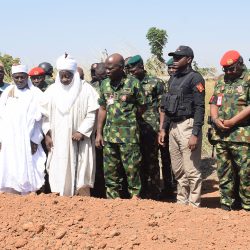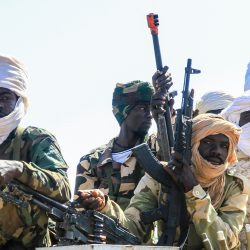Do Nigeria’s Christians need a savior?
Nigeria has responded with bewilderment and alarm to Donald Trump's repeated threats to unleash American troops to, in the U.S. president’s words, protect “our CHERISHED Christians.” Speaking in Berlin on November 4, the Nigerian foreign minister Yusuf Tuggar pointedly said “what we are trying to make the world understand is that we should not create another Sudan.” Trump had earlier warned the Nigerian government that the U.S. was prepared to “go into that now disgraced country, 'guns-a blazing', to completely wipe out the Islamic Terrorists who are committing these horrible atrocities.”
Tuggar’s mention of Sudan was a reminder of what religious war and genocide looks like and how little the international community has done to stop it. He cited Nigeria’s “constitutional commitment to religious freedom” and its status as Africa’s largest democracy as reasons why it was “impossible” that the government would look away from the kind of violence Trump described. Trump did not cite any statistics when he told reporters on Air Force One that “record numbers of Christians” are being killed in Nigeria. A multifaith country, Nigeria has the sixth largest Christian population in the world. Numbers from the Pew Center show that about 93 million Christians live in Nigeria, compared to 120 million Muslims.
The U.S. president seems to be taking his lead from Texas senator Ted Cruz. The latter posted on X last month that “officials in Nigeria are ignoring and even facilitating the mass murder of Christians by Islamist jihadists.” In his ‘Nigeria Religious Freedom Accountability Act,’ Cruz said 52,000 Christians have been killed in the country since 2009 and over 20,000 churches and religious institutions have been destroyed. These numbers have been described by the Nigerian government as “absolutely absurd” and “not supported by any facts whatsoever.” Cruz called for sanctions on Nigerians officials. In his bill Cruz also called for Nigeria to be designated a “Country of Particular Concern,” a designation reserved for states that tolerate “egregious religious freedom violations.” And on Monday the Trump administration did exactly that, arguing that the designation was necessary because Nigerians were being prevented from freely expressing their beliefs.
But speak to people in Nigeria and you will get a different analysis depending on whom you ask. The violence, perpetrated by Islamist groups like Boko Haram, Islamic State West Africa Province (ISWAP), and others is indiscriminate, claiming the lives of both Christians and Muslims. Tens of thousands of people have died and millions have been displaced as a result of the security situation in Nigeria. Many of these are residents in northern Nigeria, especially in the northeast and northwest, where the population is primarily Muslim.
In north-central Nigeria however, it is true that Christian communities have been targeted. Their demands for government action to stop the killings have fallen on deaf ears. I live for some of the year in Kwara State, a state in north-central Nigeria. In October, a distant relative was kidnapped with his entire family. My friends, family members and I have had to move house on short notice due to vicious attacks and kidnappings near where we live. But it’s hard to argue that Christians are being singled out when so many Nigerians of every background are dying.
“The irony is rich enough to choke on,” writes Elnathan John, a Nigerian novelist. “Trump’s America, where school boards ban books and churches preach ethnic purity, has appointed itself the saviour of our pluralism… One imagines a global exchange programme: our clerics and their preachers meeting to compare notes on how to weaponise God most efficiently.” Nigerians, broadly, acknowledge the insecurity in the country, and frequently debate the role of religion in the widespread violence. But everyone agrees that Trump’s motives are suspect. Before this recent outburst, Trump’s reputation in Nigeria, while mixed, consisted of support from a strong Christian base. The threat of military action over an internal issue has sparked widespread indignation and accusations of neocolonial overreach.
Subscribe to our Coda Currents newsletter
Weekly insights from our global newsroom. Our flagship newsletter connects the dots between viral disinformation, systemic inequity, and the abuse of technology and power. We help you see how local crises are shaped by global forces.
Trump’s Africa strategy is a decisive pivot away from traditional development aid and democratic institution-building toward hard-nosed commercial diplomacy, centered on U.S. access to critical minerals and African compliance on accepting deportees in exchange for financial incentives or favorable trade terms. Nigeria, notably, is one of the countries that has refused to take in deportees and was recently hit with 15% “reciprocal” tariffs. Ghana, which was also hit with 15% tariffs, just accepted 14 West African deportees.
Trump’s other approach to Africa has been to interfere in highly charged internal politics based on narratives that appeal to his base. This summer, Trump accused the South African government of enabling a “genocide” of white farmers, a highly politicized and disputed claim rooted in white nationalist rhetoric. While Trump said he would give special dispensation for white Afrikaner refugees from South Africa (tellingly, very few have actually taken advantage of his offer), he did not threaten violence on a sovereign country for its internal troubles as he has against Nigeria.
While Vladimir Putin has stayed quiet over the issue, Andrey Maslov, head of the Center for African Studies at Moscow’s Higher School of Economics said Trump is deliberately leading the U.S. down a path of isolation and focusing on the country’s internal problems. “He works for his core electorate and the future electorate of [Vice President] J.D. Vance, specifically its religious segment,” Maslov told Russia’s state-controlled media RT.
Does Trump’s foreign policy continue to help China position itself as the more reliable global partner? Expressing support for the Nigerian government, a Chinese foreign ministry spokesperson said Beijing “opposes any country using religion or human rights as a pretext to interfere in other countries' internal affairs.” China has invested billions in Nigerian infrastructure and minerals in recent years, and the value of its trade with Nigeria now outstrips that of the U.S. Has the global pattern been set – China now offers the carrot, while the U.S. wields the stick?
A version of this story was published in this week’s Coda Currents newsletter. Sign up here.
Related Articles
A tragedy in Nigeria shows the risks of cheap drone warfare
Trump, Museveni and the anti-LGBT agenda
Sudan’s forgotten war
The post Do Nigeria’s Christians need a savior? appeared first on Coda Story.





